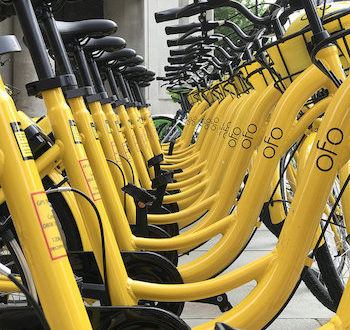Reports from Asian financial analysts and the Chinese government as well as media surveys are coming to the same conclusion: China’s bike-share boom is reducing car use in cities and even leading to forecasts that less fossil fuel will be burned in the future. And all because of the brightly-coloured bicycles now filling a great many Chinese cities. The release-by-app GPS-trackable modem-equipped bikes are cheap and simple to use, attracting newbies to cycling.
There are more than 16 million of these dockless, or "free floating," bike-share bicycles in Chinese cities. There were next to none three years ago. There are multiple Asian operators aiming to take their slice of the growing pie, but two stand out: Mobike and Ofo. Both are now also scaling up in the US and Europe.
Demand for car use and fossil fuels is expected to stagnate by 2025, reports Reuters. This is mostly down to the emergence of electric cars and improved public transport, but the "last mile" efficiencies of bike-share bikes is getting them noticed by analysts.
China’s fossil fuel demand growth is expected to slow to nearly 4 percent this year, compared with 6.5 percent growth last year, said Sri Paravaikkarasu, head of East of Suez oil at FGE.
And China’s petrol demand is expected to peak as early as 2025, according to state-owned China National Petroleum Corp.
"There used to be long queues of taxis waiting for customers outside train stations, but I don’t see them anymore," said a Beijing analyst, who took part in a Reuters survey of bike-share users.
A report from Shenzhen’s Transport Commission said that the city’s 500,000 bike-share bikes had replaced nearly 10 percent of travel by private car, and 13 percent of petrol consumption.
"If a stronger state push to reduce carbon intensity and improve air quality translates to more drivers replacing shorter-distance driving with bike rides" then China’s bike-sharing boom could lead to a signifgicant dent in petrol consumption said Peter Lee, an oil and gas analyst at BMI research.
Mobike and Ofo have attracted combined funding of more than $2 billion from venture capital and IT-specific private equity firms.
Earlier this year, the CEO of a Dublin-based dockless bike-share company told BikeBiz that the sector has the potential to shake up the cycle industry, transform urban transport and, ultimately, reshape cities.
***
A two-day UK Bike Share conference finished yesterday, and BikeBiz was there. Expect much more coverage and analysis of this sector in the months ahead, both online and in our monthly print magazine.
 BikeBiz Bicycle and cycling retail news
BikeBiz Bicycle and cycling retail news




